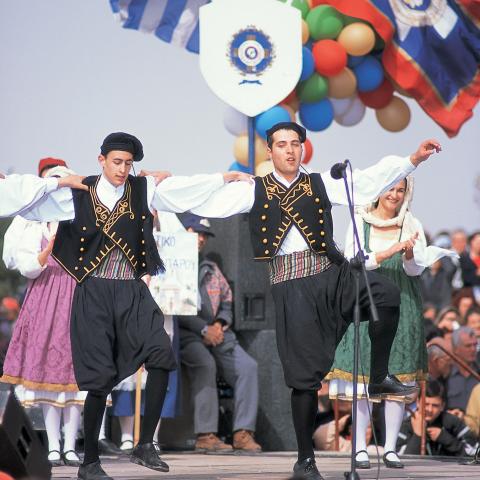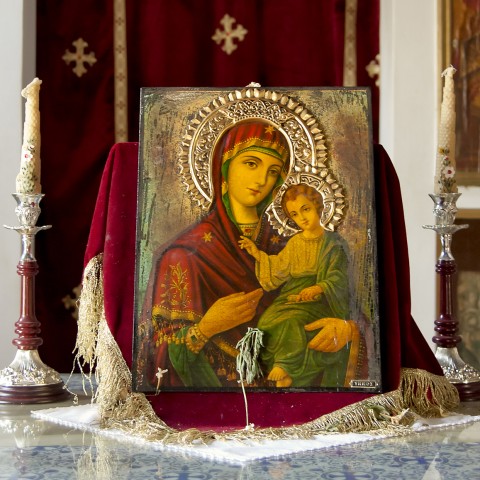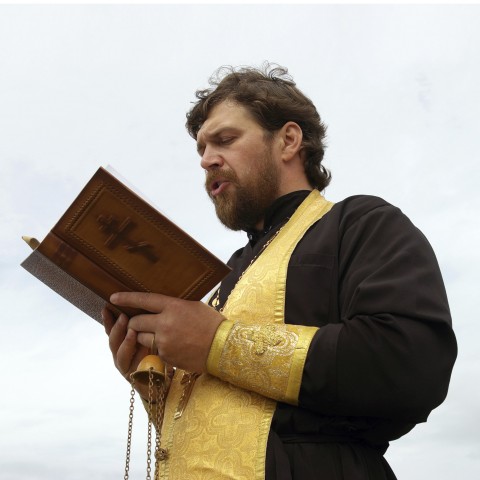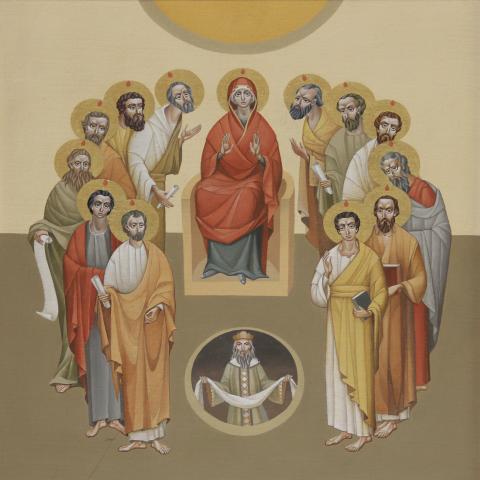
You may be wondering how to say sorry in learning Greek, and this is a good thing! It’s so important, actually, that we’ve dedicated this article to explaining how to say sorry in Greek phrases.
When it comes to expressing regret, the phrase “I’m sorry” is the most common. However, another way to express it is through a more formal apology. Did you know that the word “apology” has ancient Greek roots? Indeed it emerges from the Greek word απολογία (apoloyía) which means “apology.” More specifically, it consists of two parts: [από (apó) — “from”] + [λόγος (lógos) — “speech”].
Greeks are kind-hearted and polite people, so no need to worry if you do make a mistake. Simply apologize in a proper way, and everything will be fine.
Regardless of the occasion, GreekPod101.com is here to teach you how to say you’re sorry in Greek for a wide variety of occasions. In this article, we’ll provide you with almost all of the potential alternatives. As in English, in Greek there are many relative expressions, such as “I’m sorry,” “Apologies,” “Many apologies,” and more. Each one of them can be used in a different setting. Some of them are more formal, others are slang expressions, and still others are used in everyday life between friends.
So, let’s begin! Start with a bonus, and download your FREE cheat sheet – How to Improve Your Greek Skills! (Logged-In Member Only)
- Saying I’m Sorry Informally
- Saying I’m Sorry Formally
- Saying I’m Sorry Desperately
- Slang Phrases to Say I’m Sorry
- Other Phrases to Say I’m Sorry
- How to Reply to an Apology
- Cultural Insights
- Conclusion

1. Saying I’m Sorry Informally

We all make mistakes every day. Especially when you get in touch with people from different countries, it’s likely that you don’t know all the proper customs. So, saying you’re sorry in an informal environment is an integral part of everyday life. Especially in Greece, offering an apology in a formal or a business environment can be highly appreciated and can get you through some uncomfortable situations.
The most simple and common way to say “I’m sorry” is by saying Συγγνώμη (Signómi), meaning “Sorry.” Let’s have a look at the first example below.
Example 1: Συγγνώμη (Signómi) — “Sorry”
Greek: Συγγνώμη που άργησα.
Romanization: Signómi pu áryisa.
Translation: “Sorry for being late.”
Are you often late? Wondering how to say “Sorry I’m late” in Greek , because you know you’ll need it? No problem! (But, seriously, try not to be late often; it’s not polite, even if Greeks tend to be late!) You can use the above example to say you’re sorry for being late. In any other case, when talking with friends, a simple Συγγνώμη might do the job, if the other individual knows what went wrong. If it’s not clear what you’re apologizing for, Συγγνώμη should probably be accompanied by the reason you’re sorry.

Tip: You don’t need to know all the possible reasons that might arise. You can simply use the following general phrases, shown in the following two examples.
Example 2: Σου ζητώ συγγνώμη (Su zitó signómi) — “I apologize” / Literally: “I am asking you to forgive me.”
Greek: Σου ζητώ συγγνώμη για αυτό που έκανα.
Romanization: Su zitó signómi ya aftó pu ékana.
Translation: “I apologize for what I’ve done.” / “I am asking you to forgive me for what I’ve done.”
With the phrase shown in example two, you actually ask for forgiveness, rather than simply stating that you’re sorry. It can also be used as a standalone phrase, by simply saying Σου ζητώ συγγνώμη (Su zitó signómi), when the other person knows what you’re apologizing for.
Example 3: Λυπάμαι (Lipáme) — “I’m sorry” / “I feed sad”
Greek: Λυπάμαι για αυτό που έγινε.
Romanization: Lipáme ya aftó pu éyine.
Translation: “I’m sorry for what happened.” / Literally: “I feel sad for what happened.”
Λυπάμαι (Lipáme), literally means “I am sad.” It can be used as an alternative to Συγγνώμη (Signómi), but it is merely used when something really bad happened, regardless of if it was your fault or not. For example, when someone passes away, you can use Λυπάμαι to express that you’re sorry for the family, in accordance with the English phrase “I’m sorry.” It’s a good place to start when learning how to say “Sorry for your loss” in Greek, or even “I am sorry to hear that.”
2. Saying I’m Sorry Formally

In a formal setting, saying you’re sorry isn’t difficult either. In the two examples below, you can learn how to apologize for being late to a formal occasion. There’s typically no difference between their meanings, so just choose whichever you like.
Example 1: Σας ζητώ συγγνώμη (Sas zitó signómi) — “I apologize”
Greek: Σας ζητώ συγγνώμη για την καθυστέρηση.
Romanization: Sas zitó signómi ya tin kathistérisi.
Translation: “I apologize for the delay.”
The phrase Σας ζητώ συγγνώμη (Sas zitó signómi) means “I apologize” and it’s often accompanied by a noun or a noun expression representing the reason why you’re sorry.
Example 2: Με συγχωρείτε (Me sighoríte) — “Forgive me” / “Pardon me” / “Excuse me”
Greek: Με συγχωρείτε που δεν μπόρεσα να έρθω νωρίτερα.
Romanization: Me sinhoríte pu den bóresa na értho norítera.
Translation: “Forgive me for not being able to come earlier.”
On the contrary, the phrase Με συγχωρείτε (Me sihoríte), also stands perfectly on its own, (i.e. without stating a reason). In addition, Με συγχωρείτε is widely used when trying to pass by people in a crowded area. In that case, its meaning is similar to the English “pardon me” or “excuse me.”
As in any other formal occasions, please note that in Greek, the honorific plural is used, as demonstrated in the above examples.
3. Saying I’m Sorry Desperately

Have you ever felt extremely sad for an incident, and wanted to say you’re sorry in a more…desperate way? We’ve got you covered.
Greeks are very expressive people and aren’t afraid to show remorse. That said, here are the most common ways to express your deepest apologies in Greek.
Example 1: Χίλια συγγνώμη (Hília signómi) — “Apologies” / Literally: “One thousand apologies”
Greek: Χίλια συγγνώμη, δεν ήξερα τι έπρεπε να κάνω.
Romanization: Hília signómi, den íksera ti éprepe na káno.
Translation: “Many apologies, I didn’t know what I was supposed to do.” (Literally: “One thousand apologies, I didn’t know what I was supposed to do.)
This is a very common expression, which expresses deep guilt and it can be used in both formal and informal settings. After all, who wouldn’t forgive you if you offered one thousand apologies?
Example 2: Σας ζητώ ταπεινά συγγνώμη (Sas zitó tapiná signómi) — “I humbly apologize”
Greek: Σας ζητώ ταπεινά συγγνώμη για το λάθος μου.
Romanization: Sas zitó tapiná signómi ya to láthos mu.
Translation: “I humbly apologize for my mistake.”
As the American actor Kevin Hart said: “Being humble matters.” So, by apologizing in a humble way, you truly express your regret. This phrase shows a more formal tone and therefore it’s most commonly used in unfortunate formal occasions. In Greece, it’s often used by someone when talking to a person of superior status, given that the incident which took place or the mistake that was made was really serious.
Example 3: Ειλικρινά συγγνώμη (Ilikriná signómi) — “Honestly I’m sorry”
Greek: Ειλικρινά συγγνώμη για ό,τι έγινε.
Romanization: Ilikriná signómi ya ó,ti éygine.
Translation: “Honestly I am sorry for what happened.”
The third example demonstrates another way to express how sorry you are, by saying that you’re honestly sorry for what happened. Nevertheless, it’s regarded as a formal expression.
4. Slang Phrases to Say I’m Sorry

Of course, as in any other language, in Greek there are some slang expressions to express an apology. Although we strongly advise that you don’t use them, as they’re not quite proper, we’re presenting two of the most common examples, so that you’ll be able to recognize them if you happen to hear them.
Example 1: Σόρι (Sóri) — “Sorry”
Greek: Σόρι, φίλε μου.
Romanization: Sóri, fíle mu.
Translation: “Sorry, my friend.”
Despite the fact that this is a phrase you’ll hear being said amongst Greek teenagers and young people, it can be accepted as an apology in other occasions too, as almost all Greeks tend to integrate English words and phrases into their vocabulary.
Example 2: Παρντόν (Pardón) — “Sorry”
Greek: Παρντόν. Δικό μου το λάθος.
Romanization: Pardón. Dikó mu to láthos.
Translation: “Sorry. My mistake.”
This is a more old-fashioned slang phrase that has a French origin. It was quite popular amongst males who wanted to appear dominant in the 70s and 80s. Today, it’s still used every now and then as a slang phrase, but not as often as the former.
5. Other Phrases to Say I’m Sorry

Here are some alternative phrases that can be used to say you’re sorry. More or less, all of the expressions below can be used regardless of the formality of the occasion.
Example 1: Δεν θα το ξανακάνω (Den tha to xanakáno) — “I won’t do it again”
Greek: Καταλαβαίνω τι έγινε και δεν θα το ξανακάνω.
Romanization: Katalavéno ti éyine ke den tha to xanakáno.
Translation: “I understand what happened and I won’t do it again.”
Example 2: Δεν το εννοούσα (Den to enoúsa) — “I didn’t mean it”
Greek: Συγγνώμη για αυτό που είπα. Δεν το εννοούσα.
Romanization: Signómi ya aftó pu ípa. Den to enoúsa.
Translation: “Sorry for what I’ve said. I didn’t mean it.”
Example 3: Ελπίζω να με συγχωρέσεις (Elpízo na me sinhorésis) — “I hope you’ll forgive me”
Greek: Καταλαβαίνω το λάθος μου και ελπίζω να με συγχωρέσεις.
Romanization: Katalavéno to láthos mu ke elpízo na me sinhorésis.
Translation: “I understand my mistake and I hope you will forgive me.”
Example 4: Αναλαμβάνω την πλήρη ευθύνη (Analamváno tin plíri efthíni) — “I take full responsibility”
Greek: Αναλαμβάνω την πλήρη ευθύνη για αυτό που έγινε.
Romanization: Analamváno tin plíri efthíni ya aftó pu éyine.
Translation: “I take full responsibility for what happened.”
Example 5: Δεν έπρεπε να το είχα κάνει (Den éprepe na to íha káni) — “I shouldn’t have done it”
Greek: Ειλικρινά το μετάνιωσα. Δεν έπρεπε να το είχα κάνει.
Romanization: Ilikriná to metániosa. Den éprepe na to íha káni.
Translation: “I honestly regret it. I shouldn’t have done it.”
Example 6: Είναι δικό μου (το) λάθος (Íne dikó mu [to] láthos) — “It’s my mistake”
Greek: Είναι δικό μου (το) λάθος και δεν θα ξανασυμβεί.
Romanization: Íne dikó mu (to) láthos ke den tha xanasimví.
Translation: “It was my mistake and it won’t happen again.”
Example 7: Σε παρακαλώ, μη μου θυμώνεις (Se parakaló, mi mu thimónis) — “Please, don’t be mad at me”
Greek: Σε παρακαλώ, μη μου θυμώνεις για αυτό που είπα.
Romanization: Se parakaló, mi mu thimónis ya aftó pu ípa.
Translation: “Please, don’t be mad at me for what I said.”
6. How to Reply to an Apology
Replying to an “I’m sorry” statement is common and polite in Greek culture. Here are some common phrases you can use when receiving an apology.
Example 1: Σε συγχωρώ (Se sinhoró) — “I forgive you”
Greek: Σε συγχωρώ, μην ανησυχείς.
Romanization: Se sinhoró, min anisihís.
Translation: “I forgive you, don’t worry.”
Forgiving someone is the simplest and most polite way to reply to an apology in Greek. So, when someone says Συγγνώμη (Signómi) meaning “I’m sorry,” or even a similar expression such as the ones mentioned above, the proper reply is Σε συγχωρώ (Se sinhoró) meaning “I forgive you.” However, in many cases an even more polite way to accept an apology is to say Δεν πειράζει (Den pirázi) meaning “It’s alright” / “It doesn’t matter,” as shown in the example below. This phrase is most commonly used when the individual doesn’t use a phrase that includes being sorry, but uses another more descriptive phrase such as “It’s my fault” instead.
Example 2: Δεν πειράζει (Den pirázi) — “It’s alright” / “It doesn’t matter”
Greek: Δεν πειράζει, δεν έγινε τίποτα.
Romanization: Den pirázi, den éyine típota.
Translation: “It’s alright, nothing happened.”
Both examples above can be used as a reply in formal as well as informal settings. On the contrary, the next example demonstrates a more informal way to reply to an “I’m sorry” statement, which is usually used between friends.
Example 3: Συγχωρεμένος/-η (Sinhoreménos/ -i) — “You are forgiven”
Greek: Δεν πειράζει, συγχωρεμένος/-η.
Romanization: Den pirázi, sinhoreménos/-i.
Translation: “It’s alright, you are forgiven.”
In this case, Συγχωρεμένος (Sinhoreménos) is used when the person expressing an apology is male, and Συγχωρεμένη (Sinhoreméni) is used when the person is a female.
7. Cultural Insights
In Greece, saying you’re sorry or expressing an apology any other way is often accompanied by tilting the head a bit in the front and staring at the floor, as a sign of true remorse. The official religion of Greece has always been Orthodox Christianity, which is based on the concept of forgiveness, so the act of asking for forgiveness and forgiving is something deeply rooted in Greek culture. That makes learning how to say sorry in Greek culture very important!
Nowadays, youngsters tend to avoid the phrases that include the word Συγγνώμη and try to use more descriptive phrases, only when necessary. It’s believed that this is based on the revolutionary spirit of young people, who try to avoid admitting their mistakes to older people (e.g. their parents).
8. Conclusion
Generally, Greeks are polite and forgiving. So, don’t be concerned if you make a mistake. We all make mistakes, after all. Just use the most appropriate phrase from those demonstrated in this article to say you’re sorry and everything’s going to be fine.
Do you want to learn more expressions and listen to their pronunciation? Visit our list of phrases of the most Common Ways to Say Sorry.
GreekPod101.com is dedicated to offering you a wide range of vocabulary, focusing on words and expressions used in everyday life. In addition, you can subscribe to our YouTube channel and enjoy free educational videos on the Greek language.
























































































